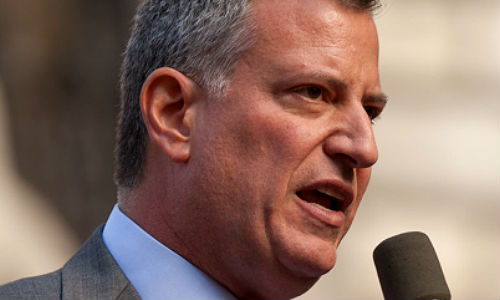 Today, Mayor de Blasio and New York City Commission on Human Rights Commissioner and Chair Carmelyn P. Malalis announce that new caregiver protections go into effect, protecting people with care giving responsibilities.
Today, Mayor de Blasio and New York City Commission on Human Rights Commissioner and Chair Carmelyn P. Malalis announce that new caregiver protections go into effect, protecting people with care giving responsibilities.
Caregiver protections such as those caring for children under the age of 18 and people caring for parents, children, siblings, spouses, grandparents, or grandchildren with a disability as well as people with disabilities who live with them, from workplace discrimination.The law, signed by Mayor de Blasio in January, protects employees from termination, demotion, or denial of promotion because of their status as caregiver. The law applies to employers with four or more employees and protects job applicants with caregiving responsibilities as well as current employees.
The new law makes it easier for New Yorkers caring for the 1.8 million children under the age of 18, 1 million people aged 65 and older, and roughly 900,000 New Yorkers with disabilities living in New York City to file workplace discrimination claims under the New York City Human Rights Law. Previously, employees who were discriminated against for having caregiving responsibilities had to file a claim of gender discrimination, based on unlawful stereotypes regarding the caregiving responsibilities of members of a particular gender. Today, those employees are directly protected under the law, one of the strongest human rights laws in the nation.
“Caregivers are the people who keep families together,” said Mayor de Blasio. “It is critical that New York City protects them so they can continue to provide essential care to the children, elderly people, and individuals with disabilities who rely on them to lead happy and healthy lives. No one deserves to be treated differently or denied opportunities in the workplace because of their status as a caregiver. Today, these unsung heroes receive direct protection under the law.”
“Caregivers keep our families and communities together,” said First Lady and honorary Chair of the City’s Commission on Gender Equity Chirlane McCray. “Hardworking parents and caregivers should not have to worry about losing a paycheck when they tend to someone they love. The new caregiver law that goes into effect today will ensure that caregivers can maintain their livelihood in the workplace while they support those who need them the most.”
“Far too often, people caring for relatives get passed up for promotions or other work opportunities because they are wrongly perceived to have less time or work less hard,” said Commission on Human Rights Commissioner and Chair Carmelyn P. Malalis. “Nothing could be further from the truth. Working parents and people caring for loved ones with disabilities are some of the hardest working people in New York City. I look forward to working with employers and businesses across the City to continue to educate them on this new protection and inform millions of New Yorkers raising kids and caring for loved ones of their rights under the law.”
“More and more, New Yorkers juggle the responsibilities of work while caring for children or other family members, and many of these workers are afraid of losing their jobs because of their family responsibilities,” said Council Member and bill sponsor Debi Rose. “I sponsored this bill because I know that most workers have limited control over their work hours, leaving little margin of error in the event of a family emergency or childcare crisis—and no one should be fired for fulfilling these responsibilities. The implementation of this landmark legislation strengthens our Human Rights Law, highlighting once again why New York City remains the best place to both work and live in the United States, if not in the world.”
The enactment of today’s caregiver law makes it illegal for employers with four or more employees to terminate, refuse to hire, deny promotions to, or disparately treat an employee because they are:
· an employee with one or more children perceived to be “too busy” for new projects or increased employment responsibilities;
· an employee with one or more children who is the primary caregiver and is perceived not to be “hardworking”;
· a single parent with sole custody of a child/children;
· the primary caregiver for a grandchild;
· caring for a sick child, spouse, parent, grandparent, or loved one with whom the employee lives;
· living with a friend of the family who has a disability and provides care for that person before and after work.
The law does not require employers to make special accommodations to caregivers outside the scope of company policy. Rather, it requires employers to provide employee leave time and workplace flexibility equally and not make assumptions about a person’s commitment or ability as an employee.
In New York City, the majority of two-parent households have both parents in the workforce, and 61 percent of women with children under age six are in the labor force. Nationally, more than 1 in 6 American workers provide care to an elderly family member or friend with a disability. This number is even higher for families living below the poverty line and is likely to increase in New York City, where the number of adults with disabilities over 60 is expected to grow by 40 percent over the next 20 years.
New York City’s caregiver law goes further than New York State’s ban on “familial status” discrimination, which only protects employees caring for children under the age of 18. New York City’s law protects employees caring for children under the age of 18 and those caring for parents, children of any age, siblings, spouses, grandparents, or grandchildren with a disability or a person with a disability residing with them, from workplace discrimination. Federal anti-discrimination law does not expressly include caregivers among its protected groups.
New York City is the 10th jurisdiction in the nation to prohibit discrimination against an individual because that individual contributes to the care of a dependent. Similar caregiver protections exist in Minnesota, the District of Columbia, Philadelphia, and a handful of other cities and counties.
The New York City Human Rights Commission is the City agency charged with enforcing the New York City Human Rights Law, which protects against citywide discrimination based on 22 protected categories, 18 specific to employment. The Commission will investigate and prosecute all instances of caregiver discrimination and continue to reach out to the business community to help educate business owners about their obligations under this new law.
If a member of the public believes they have been discriminated against on the basis of caregiver status in the workplace, they should call 311 and ask for the Commission on Human Rights where they can discuss their situation and set up a meeting with a Commission attorney.
For more information, visit the Commission online at www.nyc.gov/humanrights. For more information on the caregiver protections under the New York City Human Rights Law, see the following resources:
· Know Your Rights Fact Sheet for Employees
· Know Your Obligations Fact Sheet for Employers
· FAQ on Caregiver Protections
“Today New York City’s 900,000 residents with disabilities, their families and loved ones are afforded the protections and respect they deserve under the City’s Human Rights Law,” said Mayor’s Office for People with Disabilities Commissioner Victor Calise. “Every person needs care and support from spouses, children, and other loved ones. For some New Yorkers with disabilities, this support can be absolutely critical at times. By showing caregivers across the five boroughs that we acknowledge and appreciate their contributions, we are progressing in our goal to make New York City the most accessible city in the world and the best big city in America to raise a family.”
“The Department for the Aging applauds this landmark legislation,” said Department for the Aging Commissioner Donna Corrado. “The Department for the Aging funds caregiver services in every borough and provides information and referrals through its Alzheimer’s and Caregiver Resource Center. Concerns about job security take a huge emotional toll on caregivers torn between work obligations and caregiver responsibilities. This law will help tremendously to reduce their stress so they can be both better caregivers and better employees. It goes a long way toward recognizing the long-overlooked value inherent in caregiving.”
“Today, the New York City Caregiver Law goes into effect, making New York City the largest city to explicitly protect family caregivers from workplace discrimination,” saidA Better Balance Co-Founder & Co-President Dina Bakst. “Parents and others caring for family members in the five boroughs now have the full force of the NYC Human Rights Law on their side when they encounter bias on the job — women like Dena Adams, who called our hotline after losing her job because she was a single mom. A Better Balance looks forward to working together with the NYC Commission on Human Rights to ensure family caregivers know their rights and feel empowered to exercise them.”
“AARP applauds our City leaders for taking a significant step to help family and informal caregivers balance work and the invaluable care they provide for their loved ones, said AARP New York State State Director Beth Finkel. “Caregiving can be expensive, stressful, and isolating, and many family caregivers also work full- or part-time jobs. Common sense solutions like flexibility at work, which this caregiver employment discrimination protection law helps ensure, will enable caregivers to continue providing their significant, unpaid contributions to our loved ones and to our healthcare system.”
Become a Harlem Insider!
By submitting this form, you are consenting to receive marketing emails from: . You can revoke your consent to receive emails at any time by using the SafeUnsubscribe® link, found at the bottom of every email. Emails are serviced by Constant Contact








